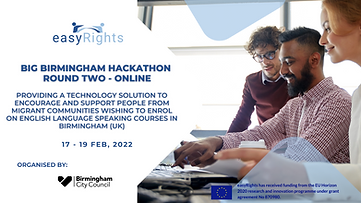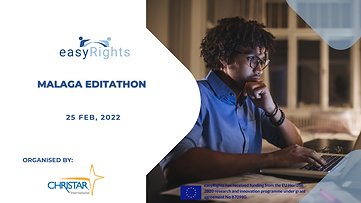Hackathon 2022 - Results
The second round of hackathons closed successfully!
2nd round of Hackathons - Solution Results
-
Birmingham and Larissa, following the original easyRights hackathon format, obtained technical solutions to be integrated into the existing service procedures associated with the chosen challenge. The awarded solutions were chosen based on their response to the challenge, the integration of the easyRights technical tools, and the compatibility with the existing service provision.
-
Malaga and Palermo, which hosted wiki-based hackathon events, generated two versions of this collaborative online space, each of them aiming to respond to the particular demands of their local migrant community. In this case, the evaluation criteria of the solutions focused on the content collection and structure, but also on the sustainability potential of the space in the long term.
Birmingham
Birmingham City Council aimed at removing the language barriers identified in the registration for their English courses, especially for migrants with very low English skills. The awarded solution, called New Comers, proposes to ease the registration process of migrants joining the ESOL courses by matching them with alumni of the courses. The team designed a web-based application that integrates with the ESOL website. In different languages, the migrants arriving on the ESOL page are welcomed and invited to pair up with volunteer alumni of their same nationality or language who, through a chat feature, can support them with the registration process. In this way, especially those migrants with pre-entry level English skills can overcome the fear of missing out on important information or performing appropriately during the registration and assessment process prior to the beginning of the English course.
Larissa
An online website application designed to overcome the frustrations and challenges associated with the process that migrants in Larissa follow to register a newborn at the Registry Office and assign a name to them. For this purpose, the team proposed a digital tool where, prior to the birth, parents can be informed about the data and documents requested from the hospital during childbirth and save them in the application, so that they have easy and immediate access to them when the moment comes. After the birth, the parents’ and newborn’s data is collected by the hospital officers and sent to the registry office, which transfers it to the application so it can be confirmed or corrected by the parents. Once the information is correct, the parents can select one of the available time slots – set by the municipality officers – for the appointment at the Registry Office in order to physically sign and receive the birth certificate. Due to the problems identified along the journey of this service with the misspelling of the migrants’ personal data, the awarded solution proposed to integrate the CALST solution. This tool could facilitate migrants’ pronunciation training to reduce the problems associated with the collection of data by the hospital and the Registry Office. The value proposition of the solution and the proposed implementation timeline were the two main criteria that made Roob the awarded team. More info on the solution can be seen in the below video.
Malaga
The outcome of the Malaga hackathon, more than a solution, was an iteration and first test of a solution. In particular, an already-established first wiki-space dedicated to collecting information on the asylum-seeking and job-seeking processes in Spain. Some weeks before the event, the Next Generation team, together with the Malaga pilot and the easyRights WP3 team, established the structure of the Malaga wiki-space according to the migrants’ information needs found during the pre-hack activities. As the two processes chosen by the Malaga pilot (application of international protection and job seeking) are closely linked, and the first cycle had ended with the winning team dropping out and not building a solution for the application for asylum, it was decided to embrace the two topics during the second cycle and, therefore, in the solution. The reasons that explain why a wiki-space was the ideal solution for Malaga are further described in section 3.3.2 of deliverable D3.3 Second Hackathon Report. In short, it was the complexity of the two services and the lack of an official procedure or institution of reference that lead to deficient and unsatisfactory information practices. The Malaga wiki counts the same features and technical possibilities as the Palermo one. In terms of the content, it is divided into two main branches, one for each of the targeted processes. In the one dedicated to the application of international protection, migrants (or supporting organisations) can get answers to questions related to the overall meaning of asylum and being recognized as a refugee, the national and international legislation, the different steps of the procedures, the documentation associated with the process, the rights and responsibilities of asylum seekers, and other frequent questions migrants may have during the process. In addition, there is a section dedicated to collecting migrants’ stories in relation to the process. The branch about job seeking covers the two situations migrants may encounter when looking for a job: having work permission, or not having it (yet). Depending on this situation, migrants (or supporting organisations) can access information regarding what to do, how to prepare their CVs, how to validate their education titles, where to find capacity-building opportunities, etc. This part of the structure is also counted with a FAQ section and one dedicated to the migrants’ stories in this process.
Palermo
Among the five wiki-space proposals presented in the final session of the second Palermo Hackathon, the one considered the most valuable by the jury was made by the Next Integration team. The awarded wiki-space proposed a different structure for each of the three potential target groups of the solution – migrants, employees, and organisations – and a significantly-high-quality content was distributed according to their needs. The chosen wiki engine (wiki.js) allowed the creation of different profiles and the curation of the edited information by those designated as managers. It is also optimised for its use on mobile devices, which constitute the main access points for migrants. The platform also offered high flexibility and the option for displaying the information in multiple languages, adapting to the native language of the migrant. Its flexible structure, wide customization options, and optimization for use on mobile phones were the decisive aspects to granting the Next Integration team the main award of the hackathon. The intuitive way in which the contents are presented and the possible future integrations were also appreciated. In addition, due to the high quality of all the projects submitted, the municipality of Palermo agreed to allocate some extra budget to award a second team that could also contribute to the further development of the wiki-space. Therefore, the jury decided to also award the Lorem Ipsum team because of their excellent user research work done during the hackathon to collect and organise the information on the challenge. More info on the solution can be seen in the below video.
More details about the 2nd round of hackathons and the awarded solutions can be found in deliverable D3.3 Second Hackathon Report.




